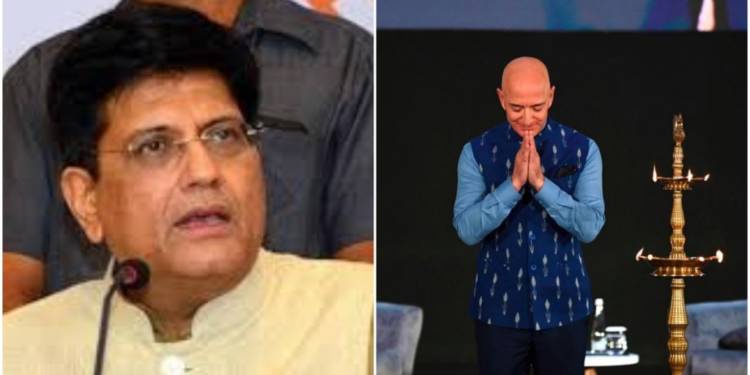Union Commerce and Industry Minister, Piyush Goyal, has once again upheld India’s interests by snubbing the Amazon founder and CEO on his India visit even as the latter drew flak for allegations of predatory pricing and a discriminatory practice of “Preferred Sellers” against Amazon.
At a time when Goyal has made it clear that the Modi government won’t bow down before anyone or tolerate unfair practices that are opposed to India’s interests, the Congress has once again found an opportunity of misleading the entire nation about a critical issue.
Taking to Twitter, Congress leader, Shashi Tharoor said, “This is a fine way to woo investors to make India a $5trillion economy!” Even P. Chidambaram posted a Twitter thread wherein he tried taking a jibe at Piyush Goyal over the snub to the Amazon founder & CEO
This is a fine way to woo investors to make India a $5trillion economy! https://t.co/xqr1DYV5EQ
— Shashi Tharoor (@ShashiTharoor) January 17, 2020
Commerce Minister snubbing Amazon's Jeff Bezos makes for a great headline in the world's media.
— P. Chidambaram (@PChidambaram_IN) January 16, 2020
While the Congress is trying to paint Goyal and the Modi government in a bad light by claiming that the present dispensation is blocking investments, by saying that the $1 billion investment by Jeff Bezos is not a favour to India, but the issue is not as simple as the Congress is trying to suggest.
In fact, the interests of crores of small traders in India is at the core of Goyal’s bold decision to snub the world’s richest man. Amazon is infamous for offering impossibly high rates of discount, sometimes below the cost price, throwing competing retailers out of business. This has led to allegations of predatory pricing against the e-commerce giant. The small and medium Indian traders have been the biggest casualty.
Another issue against the Amazon, which is also facing a Competition Commission of India (CCI) probe into alleged competition law violations, is its policy of “preferred sellers”, which has also emerged as a murky and suspicious. There is no clarity as to the criteria for selecting preferred sellers. Such preferred sellers resort to deep discounting which sometimes borders on predatory pricing. There are also allegations of the “preferred sellers” being affiliated with or substantially controlled by Amazon. Such affiliation could be a violation of the 49 per cent cap on FDI in multi-brand retail.
The losses suffered by Amazon only further raises the suspicions of predatory pricing against the e-commerce giant. Even Goyal had pointed this out when he said that if in a fair market place model in a turnover of $10 billion, a company is incurring losses to the tune of billions of dollars, then it “certainly raises questions, where the loss came from”.
By snubbing Bezos on his three day India visit and not falling for his PR exercise that he by announcing an investment of $1 billion towards digitizing small and medium businesses across India, Piyush Goyal only stood for the interests of small-size traders and retailers in India. In fact, ever since Piyush Goyal took charge as the Union Commerce and Industry Minister, India has made it clear that domestic sentiments and interests won’t be compromised at any cost.
Last year, farmers and industry leaders had applauded the decision made by the Modi government to ditch Chinese dominated RCEP deal. Several sectors of the Indian economy resisted the deal out of the fear that the multilateral free trade deal would hamper their interests as the other countries in the multilateral deal enjoyed an advantage in those sectors. A multilateral deal like RCEP, with India’s concerns unaddressed, would have further widened trade deficit with member nations, a factor that weighed in heavily in Modi government’s decision to reject the deal.
Later on, the Union Commerce Minister, Piyush Goyal had informed the Lok Sabha that India did not join the RCEP because it did not address India’s outstanding concerns. The Union Minister had therefore made it clear that India’s domestic interests was the driving reason behind Modi government’s decision to ditch the mega free trade deal.
Even in 2016, the Modi government had rejected Facebook’s Free Basics in a bid to ensure the principle of net neutrality. Even then the Modi government had ensured that domestic interests prevailed over the social media giant’s attempt to push Free Basics platform, which a small set of services free of cost. The Telecom Regulatory Authority of India (TRAI) had issued a release stating, “Given that a majority of the population are yet to be connected to the Internet, allowing service providers to define the nature of access would be equivalent of letting TSPs (telecom service providers) shape the users’ Internet experience.”
It is this same policy of safeguarding domestic interests and sentiments which led to Piyush Goyal’s remarks against the world’s richest man and his e-commerce company. When Bezos arrived in India, he was greeted with massive protests by small traders within India. The fact remains that Amazon’s policies of deep discounts and “preferred sellers”, and allegations of predatory pricing have left a profound impact upon India’s domestic concerns, an issue that the Modi government couldn’t have ignored.
Piyush Goyal did not make any remarks that could have even remotely suggested that he is opposed to foreign investments. In fact, all that he signified was the fact that India intends to strictly enforce its rules. No exception is made out even for a business giant, and the country holds every right to express displeasure when a business major tries to find loopholes in order to game the system or make an outright contravention of the law of the land.
Piyush Goyal has displayed traits of a great leader by standing up boldly against attempts to hamper India’s business interests. The Union Minister deserves a pat on his back for repeatedly acting in protection of India’s interests.




























